The Best Hospital Management Software
We’ve reviewed the top hospital management software for small to enterprise healthcare organizations alike, helping you automate key functionalities like EHR, medical billing, and financial management.
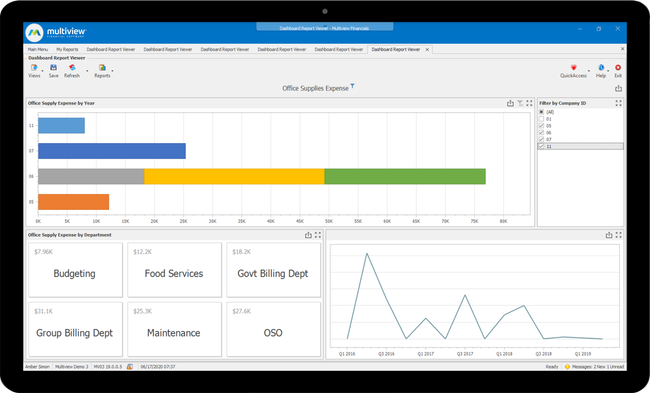
- ViewPoint tool offers strong reporting and analytics
- Scalable, user-based pricing model
- Includes 18 fully integrated modules for different industries
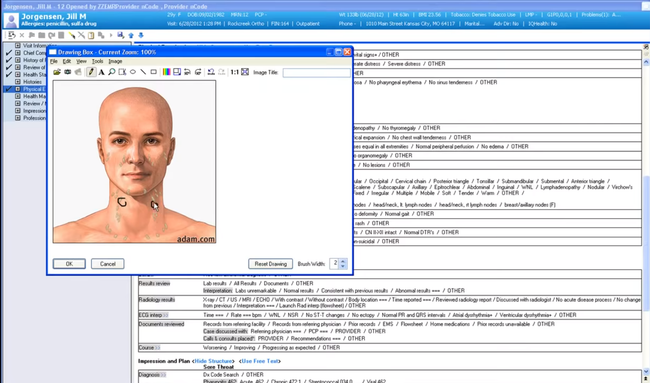
- Advanced analytic packages available
- Offers strategic consulting services to improve value-based care
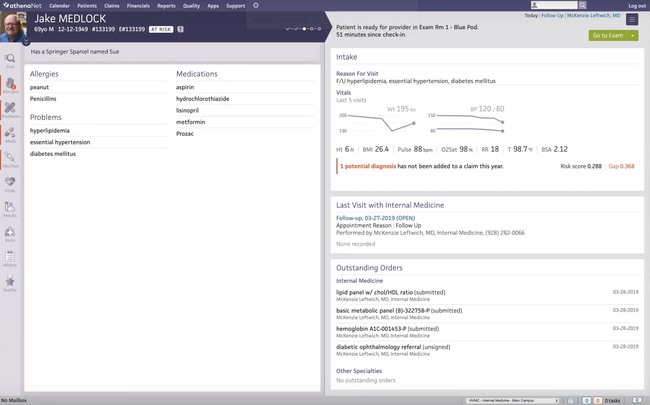
- Effectively cuts down on manual work
- Offers revenue cycle management tools
- Integrates with practice management solutions
These platforms help you organize everything from electronic health record management to financial analysis. We’ve ranked our favorite hospital management systems for organizations of all sizes.
- Multiview: Best Financial Management Tools
- Oracle Health ERP: Best for Enterprise Hospital Networks
- athenaOne: Best for Medical Billing
- Epic Systems: Best Patient-to-Provider Workflows
Multiview - Best Financial Management Tools
Multiview ERP’s financial management module allows you to track funds across departments, grants, programs, and foundations. It provides fund-level reporting, so you can adhere to donor restrictions or specific grant conditions while having full transparency. This is crucial for hospitals that have diverse revenue sources like Medicare, private payers, Medicaid, etc.
Additionally, the general ledger allows you to have multiple segments in your chart of accounts. You can accurately track financials at the unit, department, or program level, helping identify areas of overspending to reduce expenses. Also, it integrates directly with your EHR, streamlining processes like accounts payable approvals and keeping audit trails for GAAP and ASC 606 standard compliance.
Multiview ERP is ideal for smaller hospitals, rural healthcare systems, and community health centers. The smaller-scale focus allows it to better serve organizations that don’t need an enterprise solution like Oracle Health ERP or Workday. While pricing is not available publicly, it’s much more affordable than those systems.
Read more about Multiview ERP.
Oracle Health ERP - Best for Enterprise Hospital Networks
Oracle Health ERP, formerly Cerner, is a modular system that can support the needs of national or even global healthcare networks. The built-in EHR module features a computerized provider order entry (CPOE) feature that allows physicians from every location across the enterprise to enter medical orders into the system digitally. It supports order entry for all different domains, including:
- Medication orders: Inpatient, outpatient, and specialty medications
- Lab tests: Route to in-house and external labs
- Imaging requests: MRI, radiology, ultrasound, etc.
- Procedures and referrals: Surgeries, consults, and specialist services
Oracle Health’s EHR also features a full audit trail to ensure compliance. Orders placed into the system are time-stamped with the doctor’s user ID, so there’s full accountability for every patient subscription or referral. If there are missed medication administrations or unacknowledged critical orders, the system automatically flags them and alerts you so they can be resolved immediately.
Oracle Health ERP is only suitable for enterprise operations. The system includes a full ERP suite alongside a tightly integrated EHR platform. The database is built to handle multi-facility and cross-regional hospital systems, so even regional networks will need to look at a more affordable and smaller-scale system like Multiview ERP.
Learn more about Oracle Health ERP on our product profile page.
athenaOne - Best for Medical Billing
athenaOne offers a strong medical billing module that can help boost your financial performance. It features a workflow dashboard that consolidates all your claim and appointment-related tasks on one screen. You can filter by department or location and see descriptions of each work queue. The columns show crucial metrics like total holds, no-shows, and missing slips. It’s a great way to organize all billing tasks, so everyone can stay up to date in real time.
Additionally, the module helps ensure you make accurate claims. All the info you need is right on the screen, so you don’t need to go back and forth between pages when filling them out, resulting in fewer errors. And even when mistakes are made, the billing rules engine will catch and flag them before you submit.
athenaOne comes in an all-in-one suite of EHR, medical billing, and patient engagement modules. It’s a great option for mid to large-size hospitals that need an integrated suite of tools. Unfortunately, public pricing is not available, so you’ll need a customized quote for specifics.
See our athenaOne product profile for more info.
Epic Systems - Best Patient-to-Provider Workflows
Epic Systems delivers a comprehensive hospital management platform with connected workflows to manage everything from appointment scheduling and intake to inpatient care documentation and billing. Its MyChart portal allows patients to message doctors, view records, manage appointments, and request refills. Providers, on the other hand, can access all relevant clinical and billing data without jumping between separate systems. Everything is managed in one platform to improve documentation, coordination, and the overall patient experience.
Epic’s integrated system covers EHR, revenue cycle management, clinical workflows, scheduling, analytics, and even supply chain tools. One of its standout features, Care Everywhere, enables data sharing between different healthcare organizations, giving providers access to external medical records without compromising patient security. This is especially important for reducing duplicate tests and giving providers a complete view of each patient’s medical history, even if they were treated at different facilities.
While Epic is an excellent fit for hospitals seeking tight integration across clinical and operational departments, it is best suited to large hospital systems, academic medical centers, and enterprise-level health networks. The platform requires a multi-year implementation, dedicated IT support, and a significant upfront investment, often exceeding $500,000 to several million dollars depending on hospital size. For smaller facilities or those without complex IT infrastructure, Epic may be too costly or complex to justify.
See our full overview on Epic Systems.
What is Hospital Management Software?
Hospital management software (hospital information system) primarily assists with administrative needs in a hospital, including financial accounting, maintaining accurate patient records, and scheduling. Comprehensive hospital software assists in decision-making processes for assigning patients to the right room or ward so they receive proper care, as well as deciding when to purchase the equipment and tools your hospital needs. Hospital management software will also assist with data analysis so you can optimize the revenue cycle and properly manage your workforce.
More hospitals are turning to ERP systems to make their business processes more efficient. While nearly all hospitals have an EMR system and patient billing software in place, full ERP systems are becoming more popular to handle supply chain management, workforce management, and financial accounting.
Key Features
Financial Accounting
Financial accounting keeps track of revenue from donations and payments received from services provided, as well as expenses from payroll and medical equipment and supply purchases.
Electronic Health Records (EHR)
EHR, formerly known as Electronic Medical Records (EMR), keeps track of patient metadata and medical history. An EHR allows patient-centered records to be updated in real-time in the patient’s digital medical chart. The EHR keeps track of information, including:
- Medical records department management: tracks patient medical history and ICD numbers.
- Medical data management: keeps track of patient intake and outtake forms and medication history.
- Patient registration: stores and manages patient information, including name, date of birth, current address, phone number and email address, employment information, and insurance.
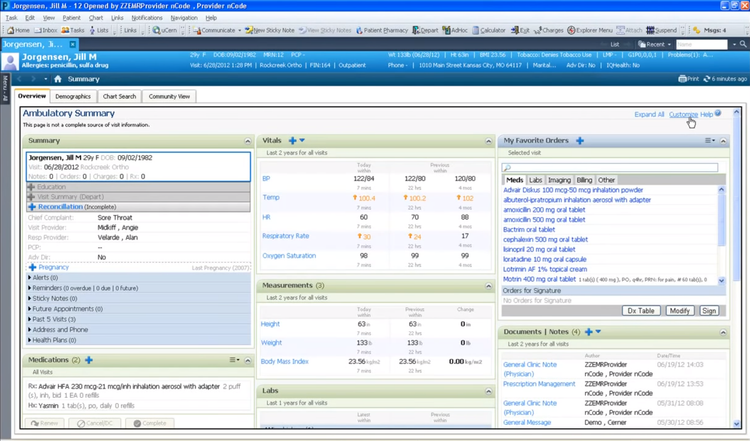
Inpatient Department (IPD) Management
Keep track of the patient’s admission details, doctors or surgeons working with the patient, the patient’s dietary specifications, patient discharge instructions, and patient consent forms.
Outpatient Department (OPD) Management
Track patient details for those that aren’t admitted including services performed (labs, procedures, diagnostic imaging and x-rays, etc), and invoicing. Hospital management systems can automatically notify patients through text messaging or email about payment due dates, appointment scheduling reminders, and updated chart data.
Patient Scheduling
Staff scheduling - assign doctors and staff to patients based on the patient’s care requirements and staff qualifications.
Room/equipment scheduling - keep track of occupied and vacant rooms, and track where equipment is and who is using it.
Appointment reminders - remind patients of appointment dates/times via text, email, or automated phone call.
Medical Billing
Medical billing manages the billing process (also referred to as revenue cycle management), which includes insurance validation before the appointment, co-pay processing, tracking and coding billable procedures performed, sending the statement to the patient, and monitoring profitability.
A 2023 AKASA survey found that 24% of hospitals in the United States don’t have a revenue cycle management system in place. Implementing hospital software in your business can help you optimize your revenue cycle by automating invoices and sending automatic payment reminders to ensure more payments are collected on time.
Risk Management and Regulatory Compliance
Hospital software’s risk management functionalities help ensure your healthcare facility stays within federal and state regulations, including:
HIPAA - Keeps protected health information secure. Hospital management systems have security measures in place to allow only authorized personnel to access private patient data.
HL7 - Health Level-7 (HL7) regulates the standards for transferring administrative and clinical data between different software applications that are used by different healthcare providers. Hospital management systems ensure that healthcare data follows HL7 standards so that the data can be accessed internationally.
Other Features
| Feature | Description |
|---|---|
| Grant Management | Helps hospitals secure grant-based funding through grant discovery application management and progress tracking. When the award is secured, monitor and report grant-related activity. |
| Asset Tracking | Track physical assets, including medical devices, imaging equipment, surgical instruments, etc. Asset tracking functionalities keep records of when the machinery or equipment was bought and the last time maintenance was done. You can also use barcode, QR code, or RFID tracking to know where your equipment is located and who is using it. |
| Medical Supply Inventory Management | Inventory management keeps track of consumable medical supplies that are used on patients that need to be regularly replenished, including medications, surgical implants, bandages, disposable PPE, etc. Hospital management systems can notify you when inventory is getting low, so you always have what you need on hand. |
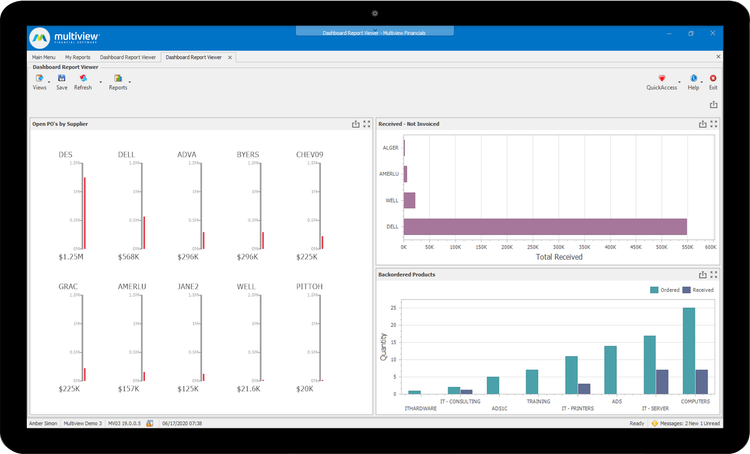
Primary Benefits
- Keeps data secure and private - Hospital management software ensures only authorized users can access sensitive patient records. Roles can be set within the system to give different levels of access to different users. For example, doctors have access to detailed medical records, while receptionists don’t.
- Information sharing between departments and other clinics - Sending patient information and medical records between departments or between clinics is easier with a hospital management system. If a doctor refers the patient to another department or clinic for further testing or an operation, the information will travel with them electronically, so patients don’t have to restate their needs.
- Spend less time looking for equipment - Asset tracking within the hospital software system helps you identify where your equipment is and who is using it, so you don’t have to spend too much time running around looking for your equipment.
- Improved revenue cycle management - Hospital management software will help you manage patient billing by tracking outstanding debts, automating invoices, and calculating interest. The software can also send automatic payment due-date reminders to patients to reduce the frequency of missed payments.
- Automate routine processes to focus on quality patient care - Your staff can focus on providing quality patient care when they’re not bogged down with routine paperwork. Patients can fill out intake forms, update their medication history, or schedule appointments online with some hospital management systems.
- Patients can pay bills, request appointments, and view medical records online - Some hospital management systems feature a patient portal that gives your patients a user-friendly interface to pay bills, manage appointments, see summaries of previous visits, and view upcoming tests or vaccination due dates from anywhere online via personal computers or mobile devices.
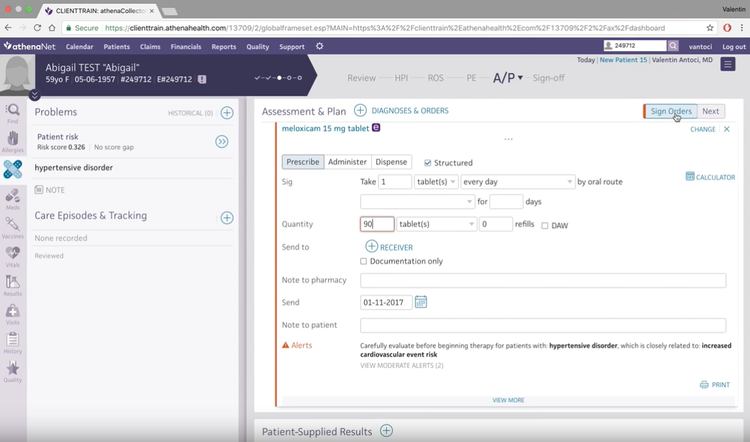
Cost of Hospital Management Software
Hospital management software pricing can vary widely based on the size and complexity of your organization, the specific modules required, and whether the solution is cloud-based or installed on-premises. Costs are also influenced by factors like user volume, customization, support, and integrated features like EHR, billing, and reporting. Understanding these variables will help you estimate a realistic budget and avoid unexpected expenses during implementation. Review general pricing ranges below:
| Facility Size | Estimated First-Year Cost Range | Features |
|---|---|---|
| Small Clinics | $5,000 – $50,000 | Basic scheduling, billing, and limited EHR functionality |
| Mid-Tier Hospitals | $50,000 – $200,000 | Includes core hospital workflows with moderate customization |
| Large Health Systems | $200,000 – $750,000 | Multi-departmental support, analytics, full RCM, and integrations |
| Enterprise Networks | $500,000 – $5,000,000+ | Full-suite ERP + EHR systems like Epic or Oracle Health with training |
Free and Open Source Hospital Management Software
Free hospital management software can work for start-ups; however, functionality and the number of users allowed are usually limited. As your organization grows, you will grow out of a free system. Open-source hospital management systems are also available, but it will be a big investment of your time to create what you need out of a system.
Some free and open-source hospital software solutions include:
- OpenMRS is a free open source EMR platform that lets you develop a custom medical record system.
- One Touch EMR is a cloud-based hospital software with electronic medical record and practice management that is compatible with Mac, Android, iOS, and Windows. A free basic plan is available, and paid plans start at $199 per provider.
- HospitalRun is a free, open-source hospital software for the developing world.
















